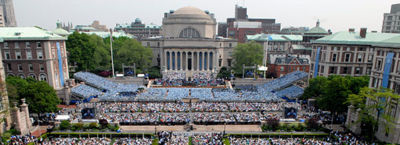University Commencement
University Commencement is the end of the line. Just over 12,000 degree candidates and more than 30,000 guests cram into Low Plaza and South Lawn and beyond.
All degree candidates receive 4 tickets for their guests. Since some candidates host more or less than 4 guests, a relatively liquid market in commencement tickets has developed. Most years some group of enterprising students set up a website to acquire or dispose of tickets.
Contents
The Ceremony
At 9:30am, the Class of 1893 bell in St. Paul's Chapel rings and marks the beginning of the the Degree Candidates Procession. This usually coincides with a loud cheer going up among the degree candidates. The soon-to-be graduates, who assemble beforehand on the upper campus, then descend down onto Low Plaza and take their seats.
At 10:30am, the Academic Procession begins, with faculty, trustees, and administrators proceeding from Low Library to their seating on the Steps. This marks the official beginning of Commencment.
President's Address
Whereas many schools invite a major public figure to deliver the keynote address at commencement, at Columbia that privilege has always been held by the University President.
This quirk is the reason for the annual complaints from Columbia undergraduates, whose Class Day speakers tend to be slightly lower profile, since a ceremony for 1,000 students doesn't have quite the pull as Commencement does. Students who expect the Class Day speaker to be high profile to make up for commencement are usually disappointed, though there have been some fine speakers in the past.
Conferral of Honorary Degrees and Awards
The Honorary Degree recipients are usually big names. The provost presents each recipient who is then hooded on stage. Also honored are the recipient of the University Medal for Excellence, the recipients of the Presidential Teaching Awards and recipients of the Alumni Medal.
Conferral of Degrees
Following Bollinger's speech and the honorary degree conferrals, each of the schools' deans (first of the undergraduate schools in chronological order, followed by those of the graduate schools in reverse chronological order) approaches the podium and presents his class to President Bollinger, asking (in an obsequious and typically witty fashion, e.g. "I beg you, sir") to accept them and confer upon them their degrees. Bollinger then accepts a scroll from them and following all the presentations officially confers upon the graduates their degrees.
Graduating members from each school typically wave (or throw) items representing their discipline during their presentation- apple cores for Columbia College, shredded newspapers for the J-School, a giant toothbrush for Dentistry, etc.
Distribution of Diplomas
After the ceremony ends, student a capella groups sing "Stand, Columbia". This is followed by a rendition of Frank Sinatra's "New York, New York," and assorted sappy songs typically associated with graduation. After "Stand, Columbia," in any case, students make their way down from Low Plaza to meet their families and guests and proceed to a pre-designated location at which they can pick up the diploma for their respective school. For CC, this is usually the upper levels of Lerner Hall. For SEAS it is with their departments.
Commencement History
Commencement had traditionally been held at churches near campus. When Columbia moved to its Midtown campus in 1857, commencement exercises were often held at the Academy of Music, a popular theater located on the corner of 14th Street and Irving Place. On the Morningside Heights campus Commencement exercises were first held in 1898 in the gymnasium in University Hall (now the Blue Gym.) Space was extremely limited and each student was only allowed a limited number of guests. Sound familiar? Since 1926 the ceremony has been held outdoors on Low Plaza, with some exceptions.
1786
In 1786, New York was still the capital of the United States. The first commencement of the newly-renamed Columbia College was considered such an important event in the city that, on April 11, Congress actually shut down to mark the occasion "to support the important interests of education by their contenance, and grace the exhibitions by their august present".[1]
1789
George Washington reportedly attends Commencement after being sworn in as President of the United States.
1811
The 1811 commencement, held in Trinity Church, has gone down in Columbia history as "The Riotous Commencement." A student was denied his diploma after he decided not to alter his commencement oration. He appealed to the audience and disorder broke out, leading to a number of arrests.[2]
1941
Commencement 1941 was tinged with sadness over the passing of baseball legend Lou Gehrig, who had attended Columbia, from his eponymous disease just one day before.[3]
1968
In 1968, commencement was not held on campus and the university president did not deliver the address, thanks to the fallout from the protests of that year. Instead history professor Richard Hofstadter delivered the address to the students gathered in St. John the Divine, many of whom staged a walk-out on a pre-arranged signal- WKCR played "The Times They Are A'Changin"- and held a counter-commencement in Morningside Park.
2020 and 2021
Due to restrictions imposed by the COVID-19 pandemic, in-person commencement ceremonies and Class Days were cancelled and replaced by virtual events. As the pandemic waned and restrictions eased the Classes of 2020 and 2021 were jointly celebrated with in-person university wide and school specific ceremonies during 2022's Commencement Week.
2024
Despite being partly set up already, University Commencement in 2024 was completely canceled a week before the event as a result of the fallout from the Gaza Solidarity Encampment, which resulted in the sealing off of the Morningside Heights campus and fear of further protest action. Even Class Days were relocated to the Baker Athletic Complex.
Google Books Archives
- University Commencement Programs (including lists graduates) 1892-1907
- University Commencement Programs (including lists graduates) 1908-1919
External links
References
- ↑ The Massachusetts Spy (Worcester, Mass.), April 30, 1786
- ↑ Frederick Keppel, Columbia, pg. 221
- ↑ http://www.nytimes.com/2011/05/29/sports/baseball/for-the-columbia-class-of-41-it-is-always-the-day-after.html
